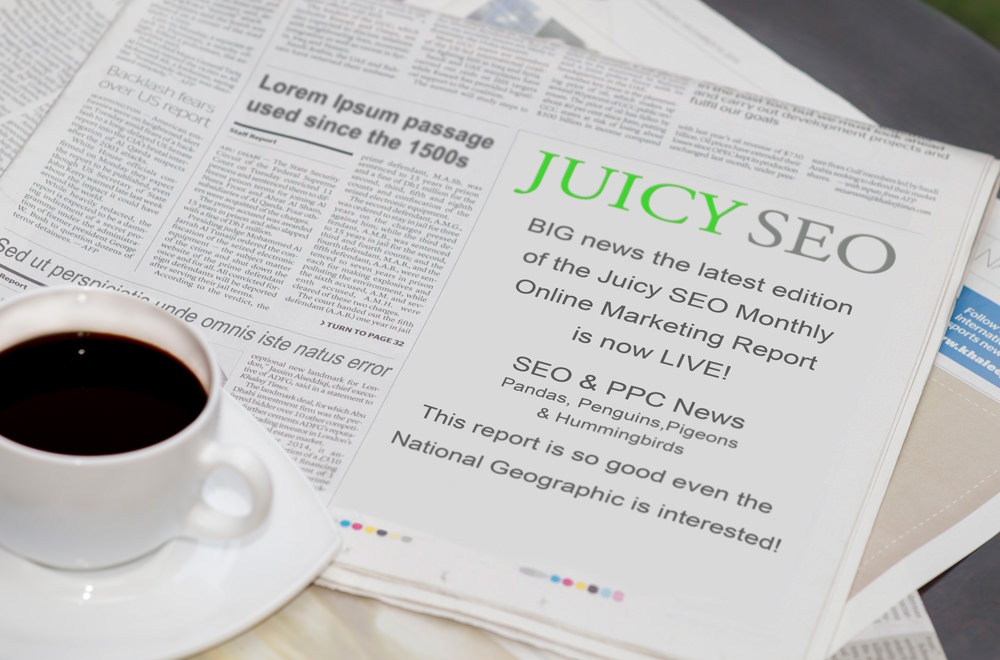Welcome to this month’s Juicy SEO Online Marketing report covering April 2016. As months go this month wasn’t the busiest in terms of search engine changes which will affect your websites. Of course, all the search engines conduct tests and cosmetic changes but this report is purely for useful facts on how to help your website perform better, and we try to keep down to a 2 minute read.
So with the introduction over and done with let’s get on with it…

Even the National Geographic are interested!
Penguin Algorithm
It wouldn’t be one of monthly reports if we didn’t include something about the Penguin algorithm. If you need a recap what each of the algorithms do there is a Glossary at the bottom of this post.
At the start of April there were a lot of talk from SEO’s in America that Google were testing a Penguin update has there were a lot of movement which an update from Penguin could have made. However, it only lasted a few hours before everything went back to normal. Is this Google testing the Penguin update or something else, or maybe just a bug? Who knows?
Just a reminder that the next Penguin update will most likely be the last one as from then onwards it will run in real time. Great news for everyone but bad news for this monthly report. 🙁
Google have said that they will inform webmasters when they will roll out the latest Penguin algorithm update, which is nice of them. We will, of course report as soon as it has happened.
HTTP2
Google have confirmed that if you upgrade your webserver to HTTP2 you will not get any ranking help from the search engine, however, your website should perform faster.
Outbound links
Google have sent out another set of messages to many webmasters via Search Console concerning outbound links. If Google thinks the links on your website to other site are ‘spammy’ they will send you a message asking you to add a rel=”nofollow” META tag to the link or remove them. If you haven’t checked already we recommend that you sign onto Search Console and check for a message.
If you are a Juicy SEO client, then don’t worry we have this all in hand! 🙂
The Title tag
Although Google say they do not use the Title tag on images to help the page rank, we know differently! Juicy SEO have been using image Title tags when optimising our clients images for years and have seen very quick positive results. This month however, a public test was conducted which also proved the same.
A good tip: If you are having trouble to rank well for a certain keyword try using an image to rank for it instead!
Click Jacking
Click Jacking websites are being penalised by Google. These are websites that display an advert but when you click on the advert a pop-up or a new window is created taking you to some other dimension, or possibly just another website. This is used for forcing the visitor onto a website that they didn’t want to go to.
Website Speed
As we reported a couple of weeks ago on our social media channels, Google have said that the speed of your website if slow will not negatively affect your ranking position unless you have been informed from Google themselves. However, it is highly recommended to try and make your page load as fast as possible for the visitor as a slow = bored visitor!
Pay Per Click – PPC
PPC news, this month Google rolled out a new Adwords tag that replaces the tag you add to your ‘Thank you’ page to record conversions. The reason for this is that the new tag will provide better results for your Adwords campaign. The problem with the old tag was if the user kept refreshing the ‘Thank you’ page the refreshes were being counted as new conversions.
That’s it for this month, of course, we are continuously adding posts to our Twitter and Facebook pages if you want to learn more or be informed of changes like the new Penguin update as soon as it happens. If you find our report useful and know of someone who would too please share!
Glossary
Panda: The Google Panda update concentrates on the quality of the web page content, if the algorithm thinks the page is of low quality it might penalise it in Google’s search results.
Penguin: Google has an algorithm called Penguin which analyses links to web pages and identifies which ones are valuable or spam links. An example of a spam link would be a paid link to your site.
Pigeon: Google’s Pigeon algorithm concentrates on Local SEO, if you have a bricks and mortar business this is something you should take note of.
Phantom (Quality Update): This algorithm rewards website pages for good content.
TDL: A TLD means Top Level Domain like .com or .net or .co.uk.

